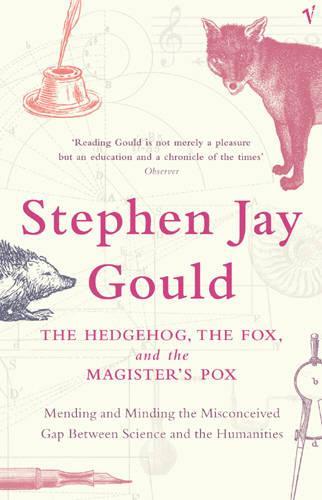Overview
The final book from the most celebrated popular science writer in the world. Completed shortly before his death, this is the last work of science from the most celebrated popular science writer in the world. In characteristic form, Gould weaves the ideas of some of Western society's greatest thinkers, from Bacon to Galileo to E. O. Wilson, with the uncelebrated ideas of lesser-known yet pivotal intellectuals. He uses their ides to undo an assumption born in the seventeenth century and continuing to this day, that science and the humanities stand in opposition. Gould uses the metaphor of the hedgehog - who goes after one thing at a measured pace, systematically investigating all; the fox - skilled at many things, intuitive and fast; and the magister's pox - a censure from the Catholic Church involved in Galileo's downfall- to illustrate the different ways of responding to knowledge - in a scientific, humanistic or fearful way. He argues that in fact each would benefit by borrowing from the other.
Full Product Details
Author: Stephen Jay Gould
Publisher: Vintage Publishing
Imprint: Vintage
Edition: New edition
Dimensions:
Width: 12.90cm
, Height: 1.70cm
, Length: 19.80cm
Weight: 0.202kg
ISBN: 9780099440826
ISBN 10: 0099440822
Pages: 288
Publication Date: 04 March 2004
Recommended Age: From 0 years
Audience:
Professional and scholarly
,
College/higher education
,
General/trade
,
Professional & Vocational
,
Tertiary & Higher Education
Format: Paperback
Publisher's Status: Active
Availability: Manufactured on demand

We will order this item for you from a manufactured on demand supplier.
Reviews
Pairs high brilliance with deep modesty. New Humanist Reading Gould is not merely a pleasure but an education and a chronicle of the times Observer Not only one of the finest scientific minds of the later twentieth century, but also one of its greatest polymaths The Times Gould strives to outline a more peaceful, mutually supportive view of the realtionship between the sciences and the humanities Nature One of the best essayists in the business. He uses his wide background knowledge...as a bridge to entice non-scientists into sharing the excitement of scientific discovery and the curious, convoluted path of new ideas through history Scotsman
Stephen Jay Gould is in full and eloquent posthumous voice as he laments a false dichotomy that has pitted science against the humanities since the seventeenth century. To illustrate the dichotomy he cites a Greek proverb which has a clever fox (read: humanities scholars) employing many cunning behavioural strategies, while the hedgehog (read: scientist) plods along with a single, albeit very effective strategy (curling up in a motionless ball with only its spiny backside showing). To make his case the author uses his beloved collection of early natural-history texts, including one that inspired the present volume, a sixteenth century piece on terrestrial mammals. It is this work that bears the mark of the Magister's pox: the Church censor left the text alone, but suppressed the names of the author and of Erasmus as iconoclasts who were not shining models of Catholic orthodoxy. Gould uses his textual evidence both to illustrate the fusion of science and the humanities as well as to show how they have always stood in opposition. He argues that in fact each of them should borrow from each other and thereby improve their own given disciplines and writes of the absolute necessity of both domains to any life deemed intellectually and spiritually full. Gould, who lived and died exemplifying that sort of consilience has the last word. (Kirkus UK)
A fitting tribute to his career, as it combines, in both style and substance, the different themes of his life's work. Blending genuine literary talents with impeccable scientific credentials, Gould crafts an elegant entreaty for scientists and scholars to spend less time complaining about each other and more time combining their considerable resources. We need both the fox and the hedgehog in any intellectual menagerie--the persistent pluralist.--Alan C. Hutchinson Globe and Mail
Reading Gould is not merely a pleasure but an education and a chronicle of the times Observer Not only one of the finest scientific minds of the later twentieth century, but also one of its greatest polymaths The Times Gould strives to outline a more peaceful, mutually supportive view of the realtionship between the sciences and the humanities Nature One of the best essayists in the business. He uses his wide background knowledge...as a bridge to entice non-scientists into sharing the excitement of scientific discovery and the curious, convoluted path of new ideas through history Scotsman A fitting tribute to his career, as it combines, in both style and substance, the different themes of his life's work. Blending genuine literary talents with impeccable scientific credentials, Gould crafts an elegant entreaty for scientists and scholars to spend less time complaining about each other and more time combining their considerable resources. We need both the fox and the hedgehog in any intellectual menagerie - the persistent pluralist -- Alan C. Hutchinson Globe and Mail
Author Information
Stephen Jay Gould was the Alexander Agassiz Professor of Zoology and professor of geology at Harvard and the curator for invertebrate palaeontology in the university's Museum of Comparative Zoology. He died in May 2002.



